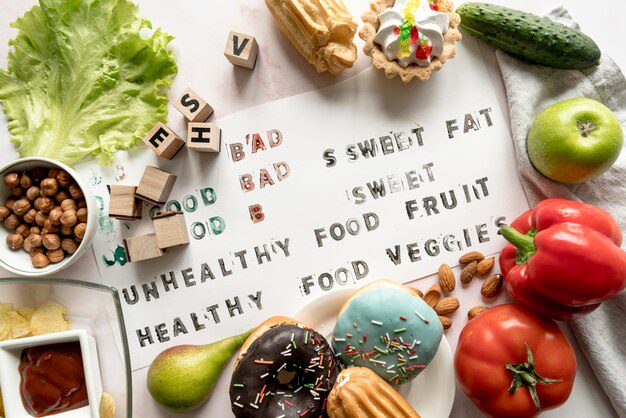This content is for informational and educational purposes only. Always consult a qualified healthcare provider.
You’ve probably heard so many conflicting nutrition advice, as it’s one thing today, and the next tomorrow. From social media influencers to outdated advice passed down from generations, misconceptions about the food we eat, tend to overshadow the truth. With so many different opinions and “rules” out there, you end up not knowing what to believe anymore. These nutritional myths can lead to confusion, unhealthy habits, and even harm if care is not taken. There are many people who take things literally, they are the ones to likely get affected the most.
Which is why this article is here, to help cut through the confusion and set the record straight on 5 common nutritional myths.
📋 Table of Contents
Top 5 common Nutritional Myths
1 . Myth: All Fat Is Bad
Truth: Not all cats are created equal, the notion that eating fat automatically leads to weight gain is wrong. Whereas what leads to weight gain is excessive eating over time, and inactivity. Though animal fats can increase the risk of cardiovascular disease, healthier monounsaturated and polyunsaturated fats found in fish, avocados, olives, and nuts can actually lower your risk of cardiovascular disease and death. Studies have shown that monounsaturated, and polyunsaturated fats do not directly lead to fat storage. They support vital processes like hormone regulation, and nutrient absorption.
Surprising isn’t it?
So, why are you scared of eating fats? You just need to find the right source of fats to eat, don’t let anyone tell you otherwise, all fats aren’t bad for you.
2 . Myth: Carbohydrates Are Bad For You
Truth: Carbohydrates are an essential part of a balanced diet, and running from them is so not necessary. And it’s just another nutritional myth that has been around for a while. However, carbs are good for you as they provide energy, digestion, and support brain function. There is so much distance that people have been told to keep from carbs, especially for those on a weight loss journey. It’s been painted as some danger zone, whereas it isn’t unhealthy. Not all carbohydrates are harmful, and it’s important to include them in your diet. Refined carbs like sugary snacks are different from whole carbs like fruits, vegetables, and whole grains. Instead of going the other direction when it comes to carbs, focus on consuming complex carbs. Some of these foods are:
- Sweet potatoes
- Brown rice
- Oatmeal
- Kidney beans
- Green peas
- Whole wheat bread
- Multigrain cereal
- Whole wheat pasta
- White potatoes
So, seriously eat your carbs, you’re going to be fine. As long as you’re eating the right amount of carbs, and watching your calorie intake, you’re good.
3 . Myth: Eating After 8 Pm Causes Weight Gain
Truth: This nutritional myth is still going strong, especially amongst young people who want to lose weight. Maybe YOU even think the same thing. Weight gain is more about the types of calories you consume, than the time of the day you eat. Although, eating earlier can be beneficial, including less chances of constipation, interrupted sleep, tummy ache and bloating. However eating late at night doesn’t equal weight gain, but having balanced meals throughout the day, and recognizing your body’s hunger cues, is key to maintaining a healthy weight. Studies show that eating nutrient dense foods throughout the day yields better results regardless of meal timing.
4 . Myth: You Need to Detox Your Body with Juice Cleanses
Truth: Detox drinks are not necessary to cleanse your body, it’s just another nutritional myth. Your body has its own natural detoxification systems, which are your liver, and kidneys. The liver and kidneys naturally eliminate toxins from your body, so you don’t need juice cleanses. Besides, you could potentially spike your blood sugar levels, and suffer from nutrient deficiencies, due to these cleanses. Rather than drinking these juice cleanses, focus on eating a balanced diet rich in fruits, vegetables, lean proteins and whole grains, to support your body’s natural detoxification process.
Although, if they’re used as a short-term supplement to a balanced diet — not a replacement, they can be a nice way of increasing your fruit and vegetable intake. However, they shouldn’t be relied on exclusively for nutrition, that’s what you need to keep in mind.
5 . Myth: All Calories Are Created Equal
Truth: This nutritional myth suggests that as long as you’re consuming the same number of calories, it doesn’t matter what you’re eating. However, all calories are not created equal, because the source of calories matters, including the quality, not just the quantity. Especially for health reasons, the source of your calories are important, which is why you need to be mindful.
Firstly, nutrient density is imperative for a healthy diet, different foods provide varying levels of essential nutrients like vitamins, minerals, and fiber. Okay look at this example:
100 calories of broccoli will provide more nutrients, than 100 calories of candy
Nutrients like protein, fiber, and healthy fats affect metabolism, energy levels, and satiety differently. Which is why some foods can help curb excessive eating, while others encourage it.
Remember that we’re not just eating for calories, and health isn’t all about calories, but nutrition is what matters in maintaining a high quality of life.
Skip These Nutritional Myths and Empower Yourself with Nutritional Knowledge
Don’t always believe everything you see online, if you’re thinking of incorporating a certain type of diet, or want to stop or start eating some foods, it’s best you consult a registered dietitian for advice. Or reputable organizations like the Academy of Nutrition and Dietetics for accurate information on nutrition. Your health is very important, and some of these nutritional myths can interfere with it, so always make sure you’re getting the right information.

